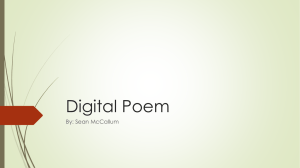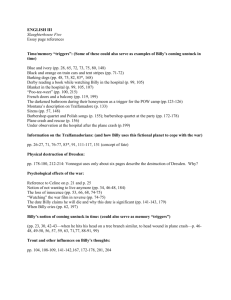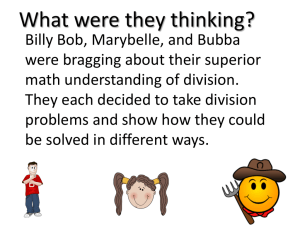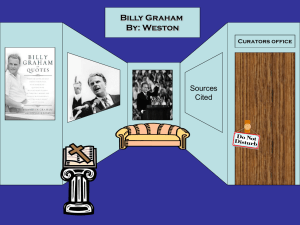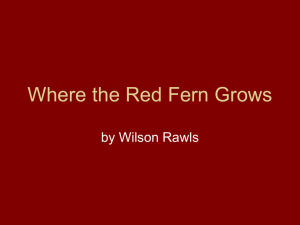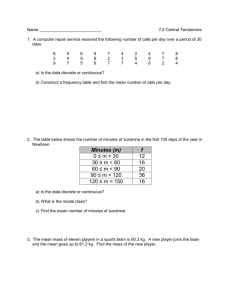Theme: Determination Billy Elliot has a number of themes present in
advertisement
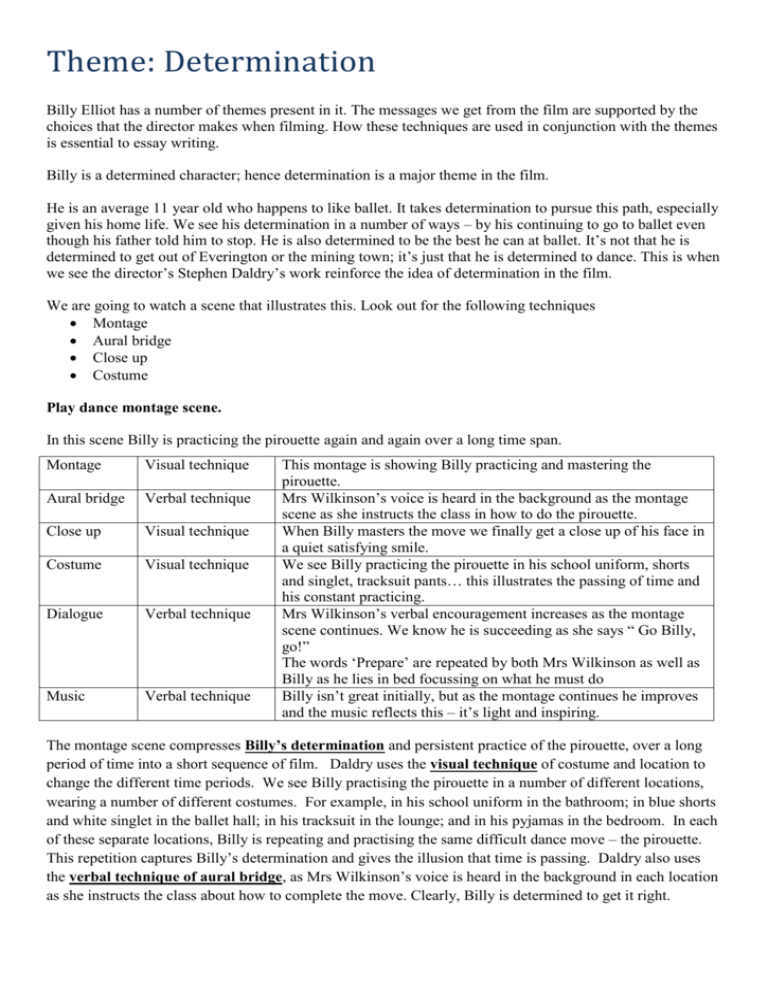
Theme: Determination Billy Elliot has a number of themes present in it. The messages we get from the film are supported by the choices that the director makes when filming. How these techniques are used in conjunction with the themes is essential to essay writing. Billy is a determined character; hence determination is a major theme in the film. He is an average 11 year old who happens to like ballet. It takes determination to pursue this path, especially given his home life. We see his determination in a number of ways – by his continuing to go to ballet even though his father told him to stop. He is also determined to be the best he can at ballet. It’s not that he is determined to get out of Everington or the mining town; it’s just that he is determined to dance. This is when we see the director’s Stephen Daldry’s work reinforce the idea of determination in the film. We are going to watch a scene that illustrates this. Look out for the following techniques Montage Aural bridge Close up Costume Play dance montage scene. In this scene Billy is practicing the pirouette again and again over a long time span. Montage Visual technique Aural bridge Verbal technique Close up Visual technique Costume Visual technique Dialogue Verbal technique Music Verbal technique This montage is showing Billy practicing and mastering the pirouette. Mrs Wilkinson’s voice is heard in the background as the montage scene as she instructs the class in how to do the pirouette. When Billy masters the move we finally get a close up of his face in a quiet satisfying smile. We see Billy practicing the pirouette in his school uniform, shorts and singlet, tracksuit pants… this illustrates the passing of time and his constant practicing. Mrs Wilkinson’s verbal encouragement increases as the montage scene continues. We know he is succeeding as she says “ Go Billy, go!” The words ‘Prepare’ are repeated by both Mrs Wilkinson as well as Billy as he lies in bed focussing on what he must do Billy isn’t great initially, but as the montage continues he improves and the music reflects this – it’s light and inspiring. The montage scene compresses Billy’s determination and persistent practice of the pirouette, over a long period of time into a short sequence of film. Daldry uses the visual technique of costume and location to change the different time periods. We see Billy practising the pirouette in a number of different locations, wearing a number of different costumes. For example, in his school uniform in the bathroom; in blue shorts and white singlet in the ballet hall; in his tracksuit in the lounge; and in his pyjamas in the bedroom. In each of these separate locations, Billy is repeating and practising the same difficult dance move – the pirouette. This repetition captures Billy’s determination and gives the illusion that time is passing. Daldry also uses the verbal technique of aural bridge, as Mrs Wilkinson’s voice is heard in the background in each location as she instructs the class about how to complete the move. Clearly, Billy is determined to get it right. Theme: Father and Son Relationships Another theme present in ‘Billy Elliot’ is father and son relationships. Billy’s home life is predominately male – his mother has died and the only woman in the house is his 70 year old Nana who is suffering from dementia. She is not a strong figure, but rather someone who relies on others. Jacky and Tony are striking miners – they are stressed, passionate, short of money and have little real time for Billy. The relationship at the beginning of the film is strained between Jacky and Billy. It appears that although Jacky does things for Billy – like giving him 50p for boxing, he has more in common with Tony due to the strikes. He attends the boxing session, but if angered to find Billy in the ballet class. He tells him in no uncertain terms that ‘Ballet is for poofs”. There is also the reference to the boxing gloves being his grandfather’s – this suggests a family tradition. However, by the end of the film their relationship has changed dramatically. The scene that is a turning point for them is after a miserable Christmas when Billy and Michael sneak into the boxing hall and Billy allows Michael to wear a tutu. When Jacky comes in he doesn’t speak, but stands face to face with Billy. This is Billy’s moment to make his father notice him – so he dances like he’s never danced before. Jacky stands rooted to the spot, unable to speak and it is as if he is seeing Billy for the first time. He exits the hall and runs away as he comes to terms with what he has witnessed. From this moment on he is prepared to support Billy – he even breaks the strike and returns to the mine as a ‘scab’. When Tony sees this, it risks their relationship too, however, Tony ultimately supports both Billy and Jacky in their goal for Billy to achieve recognition for his dancing. We are going to watch the ‘Dance of defiance’. Look out for the following techniques and see how Daldry uses them to reinforce the relationship between the two. Music Over the shoulder shot Tracking shot Symbol Verbal technique Visual technique High spirited and bouncy – reflects Billy not Jacky. We look over Billy’s shoulder at Jacky’s face Visual technique Visual technique Two shot Visual technique As Billy dances away from his father Billy dances past Jacky to bounce off the cage that is keeping him enclosed – this symbol of imprisonment is used throughout the film. Billy and Jacky standing face to face. There is a yellow line inbetween them – at the beginning they are on either side, but by the dance’s end Billy has crossed over the line to come closer in to Jacky, as though he is making himself present. The theme of father and son relationships is dealt with in Billy Elliot through Daldry’s clever use of various techniques. Jacky and Billy are quite distant at the beginning of the film – Jacky is stressed due to the strike and Billy has little in common with him. Jacky’s relationship with his older son is better due to the fact that they are both miners. Billy has been left on his own to deal with the loss of his mother – Jacky sees his role as the one to be bloke around him. A crucial moment in the film is Billy’s dance of defiance where he dances to his father and brings Jacky around to begin to understand his viewpoint on ballet. The dance scene starts the visual technique of a two shot. Jacky and Billy stand face to face with a line drawn between them, the dance scene ends with another two shot except this time Billy has crossed the line. By doing this Daldry is showing the viewer that Billy has set a challenge for his father that he must face. Another visual technique that Daldry uses is the use of symbols. A repeated symbol in the film is a cage. In this dance sequence Billy dances behind his father and slams himself against the cage. Jacky shudders as though Billy has given him a strong message that he is imprisoned and needs to be set free. Billy Elliot: An important moment An important moment in the film is the dance of defiance. This is where Billy is caught at Christmas with Michael in the ballet hall. Michael is wearing a tutu and he and Billy are dancing and having fun. It has been a miserable Xmas for the mining families and this is the boy’s safe, harmless way to have some fun. Jacky enters the hall and sees them. He has banned Billy from doing ballet, so appears angry. Although he doesn’t speak, we can tell he is mad. This is an important moment because it is a turning point for Jacky – when Billy dances he suddenly sees that his son has potential. This is Billy’s moment to make his father notice him – so he dances like he’s never danced before. Jacky stands rooted to the spot, unable to speak and it is as if he is seeing Billy for the first time. This strikes him hard as he realises how much energy he has been putting into Tony and the strikes and not allowing Billy to do what he needs. He exits the hall and runs away as he comes to terms with what he has witnessed. From this moment on he is prepared to support Billy – he even breaks the strike and returns to the mine as a ‘scab’. When Tony sees this, it risks their relationship too; however, Tony ultimately supports both Billy and Jacky in their goal for Billy to achieve recognition for his dancing. We are going to watch the ‘Dance of defiance’. Look out for the following techniques and see how Daldry uses them to reinforce how important the moment is. Music Over the shoulder shot Tracking shot Symbol Verbal technique Visual technique High spirited and bouncy – reflects Billy not Jacky. We look over Billy’s shoulder at Jacky’s face Visual technique Visual technique Two shot Visual technique As Billy dances away from his father Billy dances past Jacky to bounce off the cage that is keeping him enclosed – this symbol of imprisonment is used throughout the film. Billy and Jacky standing face to face. There is a yellow line inbetween them – at the beginning they are on either side, but by the dance’s end Billy has crossed over the line to come closer in to Jacky, as though he is making himself present. Billy grabs the opportunity to dance for his father and changes his life forever. Jacky and Billy are quite distant at the beginning of the film – Jacky is stressed due to the strike and Billy has little in common with him. An important moment in the film is Billy’s dance of defiance where he dances to his father and brings Jacky around to begin to understand his viewpoint on ballet. The dance scene starts the visual technique of a two shot. Jacky and Billy stand face to face with a line drawn between them, the dance scene ends with another two shot except this time Billy has crossed the line. By doing this Daldry is showing the viewer that Billy has set a challenge for his father that he must face. Another visual technique that Daldry uses is the use of symbols. A repeated symbol in the film is cages. In this dance sequence Billy dances behind his father and slams himself against the cage. Daldry uses this visual technique of symbolism to show Jacky that Billy is feeling trapped and needs to be set free. Jacky shudders and Billy flies into the last stages of his dance – ending it over the line and on the same side as Jacky.
